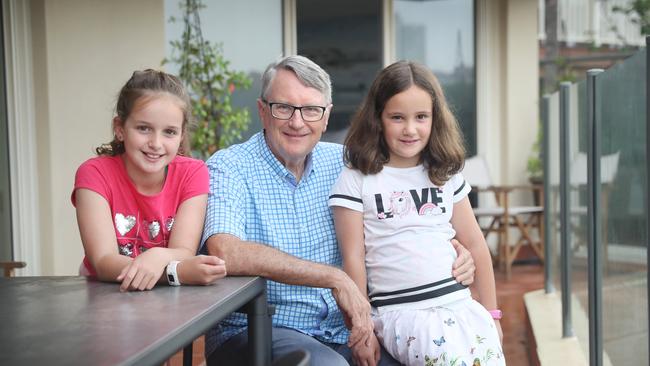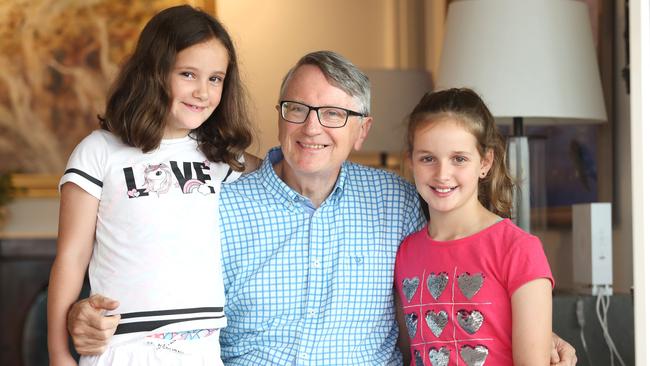Breakthrough cancer treatment doctors think might be a cure
Having diagnosed hundreds of melanomas, dermatologist Alan Cooper discovered an unusual growth on his head. This is how he beat cancer.
Health
Don't miss out on the headlines from Health. Followed categories will be added to My News.
Exclusive: Having diagnosed hundreds of melanomas in his time, dermatologist Alan Cooper knew he had a problem when he felt an unusual growth on his own head.
The Sydney doctor swiftly had the nodule cut off and began treatment, but two years on — by Christmas 2016 — was told he only had weeks to live.
The cancer spread to his neck and lungs and he enrolled in a series of clinical trials before starting a lifesaving last ditch combination immunotherapy treatment that appears to have cured him.
The professor, who has now retired from the Royal North Shore hospital, is urging melanoma patients with difficult cancers that can’t be cured by surgery to investigate the treatment which combines two immunotherapies Yervoy and Opdivo.
Immunotherapies stimulate the body’s own immune system to fight cancer.

Professor Cooper’s case was so successful he was amused to find it anonymously presented at the World Congress of Melanoma in Brisbane in 2017.
As a specialist in the field, Professor Cooper was well aware of the clinical trials available to him.
When he was first diagnosed in 2014 “there was nothing showing a lot of promise”.
He enrolled in a trial of a single immunotherapy agent and tried targeted therapies binimetinib and ribociclib but the cancer spread to his neck and “was starting to choke me.”
He was given palliative radiotherapy which made him ineligible for the clinical trial of the combined immunotherapies of Opdivo and Yervoy but doctors agreed to treat him as if he was in the trial, without adding his data.
He was given free, compassionate access to the expensive immunotherapy treatments from early 2017 and finished the trial late last year.
“Within months it seemed like everything in the neck was gone and scans at five months showed there was no cancer anywhere,” he said.
“I know a guy a month ago who had widespread tumours and started combination therapy six weeks ago and he has been told he is completely clear.
“It’s got amazing potential,” he said.
Professor Cooper said his immune system remains hyped and he has developed auto-immune bronchitis which is a side effect of the treatment.
He also gets dermatitis and nasty itchy rashes but he rates the side effects as better than the disease.

MORE NEWS
Australian scientists create virus that kills cancer
Major cancer breakthroughs of the decade
New tool to help IVF mums conceive
IVF breakthroughs to create miracle babies
Princess Alexandria Hospital Oncologist Associate Professor Victoria Atkinson said 58 per cent of patients see their tumours shrink when they use the combination therapy and others will see their tumours stop growing.
This compares to the 35-45 per cent of patients who saw their tumours shrink when they received only single agent immunotherapy.
“In 10-15 per cent of patients the tumours go away completely on combination therapy,” she said.
The latest trial results showed after five years on the combination treatment more than half the patients were still alive and doctors believed the treatment may be close to delivering a functional cure for melanoma.
Research is underway to find ways of making the therapies work in the 42 per cent of patients who currently don’t respond as well.
“I’ve been an oncologist since 2007 and when I first started out my patients would survive for nine months, I’d see them two or three times and they would never come back because they were in palliative care,” she said.
“Now some patients are living relatively normal lives and I suspect we have given them enduring control over the disease,” she said.
Originally published as Breakthrough cancer treatment doctors think might be a cure


